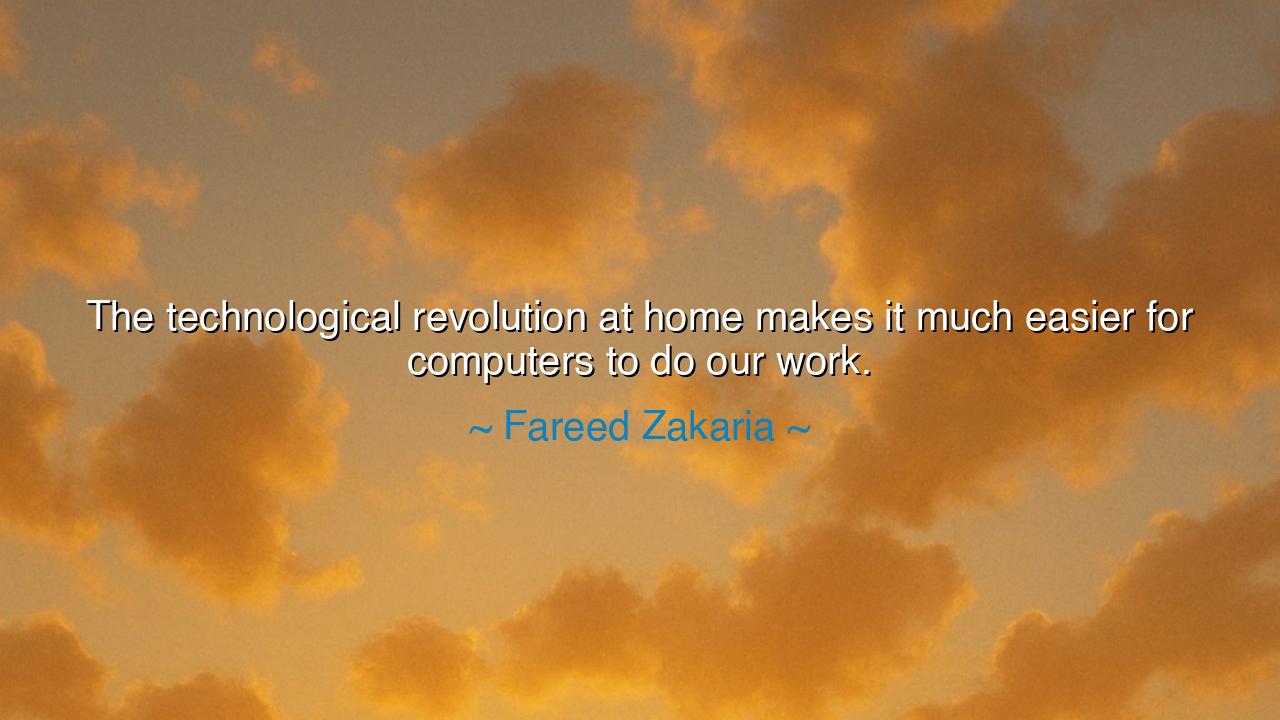
The technological revolution at home makes it much easier for
The technological revolution at home makes it much easier for computers to do our work.






Listen, O children of the earth, to the words of Fareed Zakaria, who speaks of a profound change sweeping through our world: "The technological revolution at home makes it much easier for computers to do our work." These words capture the essence of the modern era, where the tools of technology and innovation have infiltrated every aspect of our daily lives. In this age, the line between human labor and machine work becomes increasingly blurred, as computers take on tasks once thought impossible for machines to perform. Zakaria's reflection serves as a reminder of both the power and challenge that technology brings into our homes, our workplaces, and our very identities.
In the ancient world, the advent of new technologies often meant the rise of new possibilities and the reshaping of societies. The invention of the wheel, the discovery of fire, and the development of agriculture marked the dawn of human civilization, allowing people to move from primitive survival to complex societies. These early technologies did not replace human effort but enhanced it, enabling individuals to focus their energies on new ventures, from building great cities to exploring the unknown. Similarly, today’s technological revolution does not seek to erase the role of humans but to shift the nature of work, enabling us to focus on new challenges and creative endeavors that were once beyond our reach.
Consider the story of the printing press in the 15th century, when Johannes Gutenberg transformed the way information was shared. Before this invention, books were rare and expensive, requiring laborious hand-copying by scribes. The printing press allowed for the mass production of books, spreading knowledge to the masses and sparking the Renaissance and the Enlightenment. This technology didn’t erase the need for human effort, but it redefined the nature of work—by allowing ideas to spread more quickly, more widely, and more democratically. Similarly, today’s technological revolution, especially in the form of computers, is reshaping how we work, learn, and connect with each other, making tasks faster and more efficient, while creating new opportunities for creativity and innovation.
Zakaria’s words also remind us of the transformative potential of technology. As computers continue to advance, they take on more complex tasks—from automation in factories to artificial intelligence analyzing vast data sets. The promise of this technological revolution is that it will free us from the tedium of repetitive tasks, allowing us to focus on higher-level thinking, creativity, and problem-solving. Machines, once limited to simple calculations and mechanical actions, now assist us in solving the most complex problems, from mapping the human genome to predicting climate change. The work we once did with our hands or minds can now be shared with machines, creating space for new forms of human expression and innovation.
However, this technological revolution is not without its challenges. Just as the industrial revolution led to the displacement of many workers and a rethinking of labor, so too does today’s technological revolution raise questions about the future of work. If computers can perform tasks that were once done by humans, what will remain for us to do? This is where Zakaria’s insight becomes crucial: while computers may do our work, we must not lose sight of the human element that makes work meaningful. The goal is not to replace human labor but to elevate it, enabling us to engage in work that is more fulfilling, creative, and purposeful. We must ensure that we use technology to augment our capabilities rather than to diminish our potential.
The lesson here, O children of the earth, is one of balance and awareness. The technological revolution offers us great opportunities to enhance our lives, but we must remain mindful of how it changes the very nature of our work and our interactions with one another. Let us not be seduced by the convenience of technology without considering its impact on the human spirit. We must shape the future by using technology as a tool, not as a crutch, and by ensuring that it serves to elevate rather than replace the human experience.
In your own lives, O seekers of wisdom, remember this: embrace technology, but do not let it define you. Use it to amplify your creativity, to solve problems, and to expand your understanding of the world. But also remain rooted in the human aspects of work—passion, purpose, and connection. Just as the wheel and the printing press once transformed society, so too can the computer transform the way we work and live. But let us ensure that the human touch, the imagination, and the soul that make us who we are remain at the heart of all we do. Technology is the tool; we, the creators, are the ones who must wield it wisely.






AAdministratorAdministrator
Welcome, honored guests. Please leave a comment, we will respond soon